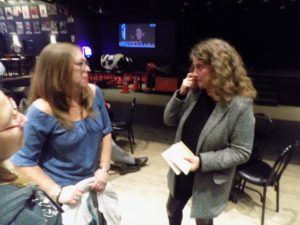Election means major changes in Quebec

Nine days before winning the election that will make him the next Premier of Québec, François Legault visited the area of Gatineau hit by the September 21 tornado. At Legault’s right is Québec Solidaire leader Manon Massé. At Legault’s left is Gatineau Mayor Maxime Pednaud-Jobin. Behind Legault and the Mayor is Maryse Gaudrault, the Liberal representative for Hull in the legislature. Gaudrault was re-elected on Monday. Photo: James Morgan
An historic change in government is coming to Quebec. The governing Liberal party was defeated in Monday’s election. The Coalition Avenir Québec (CAQ) will form then next provincial government and its leader François Legault will be Premier with 74 of the 125 seats in the legislature in Québec City. The Liberals under Philippe Couillard, who has been Premier since 2014, will form the official opposition with 32 seats.
The CAQ win is historic for Québec. The province has see-sawed between Liberal and Parti-Québécois (PQ) governments since 1970. The last non-Liberal or PQ Premier was Jean-Jacques Bertrand of the now defunct Union Nationale. The Liberals have governed Québec for most of its 151-year history as a Canadian province. The once mighty PQ, founded in 1967 by former Liberal René Lévesque, governed the province from 1976 to 1985 with its founder as Premier. It governed again from 1994 to 2003 under Premiers Jacques Parizeau, Lucien Bouchard, and Bernard Landry. In 1980 and 1995, it held referendums on taking Québec out of Canada. The separatists were soundly defeated in 1980 but almost won in 1995. In recent years, support for separation has plummeted and the PQ has been adrift ideologically. Once known for its social democratic policies, it drifted rightward, but unsuccessfully tried to return to its roots in this election. The PQ finished fourth place on Monday with just nine seats. It was eclipsed for third place by the socialist—and separatist Québec Solidaire with 10 seats. PQ Leader Jean-François Lisée did not win his own seat and resigned as party leader.
François Legault himself is a former PQ legislator and cabinet minister. He also founded the charter airline Air Transat. Legault gave up the separatist cause and formed the CAQ as a more conservative, but not reactionary alternative. However, the party did run on a promise to reduce immigration into the province. Québec has a special agreement with the federal government to have greater control over the immigration system than other provinces in Canada.

Agnès Grondin (right), the newly elected CAQ representative for Argenteuil, talking with a supporter on election night at a bar in Lachute, Québec . Photo; James Morgan
Most of the CAQ vote on Monday was from districts outside Montreal. The party did best in smaller cities and rural areas. One of those districts was Argenteuil, northeast of Montréal. CAQ candidate Agnès Grondin won the district by 5,405 votes over Patrick Côté of the Parti Québécois. Grondin’s win also makes her the first woman to represent the district. Her priorities for Argenteuil include improving public hospital services and being part of the new government’s strategy for environmental protection. The Liberal vote suffered badly in the district. Earlier this year, incumbent Liberal representative Yves St-Denis left the Liberal caucus due to an ethical problem. The Liberals nominated Bernard Bigras-Denis as their new candidate, but St-Denis still ran as an independent. Bigras-Denis placed third and St-Denis finished fifth.
Even some of the normally strong Liberal districts in Gatineau fell to the CAQ on Monday with the party picking up the Chapleau and Papineau Districts. The Liberals however retained the Hull and Pontiac seats.
In districts along the Québec-New York border, the CAQ took Soulanges and Beauharnois, which includes the area from the Ontario boundary to Valleyfield. The CAQ also won in Huntingdon, the district which immediately borders New York from Akwesasne to the border crossing at Rouses Point.
According to Élections Québec, the non-partisan agency that oversees provincial elections, over 6.1 million citizens were registered to vote, and the turnout was 66.4 per cent.
Tags: canada, politics, Québec election







